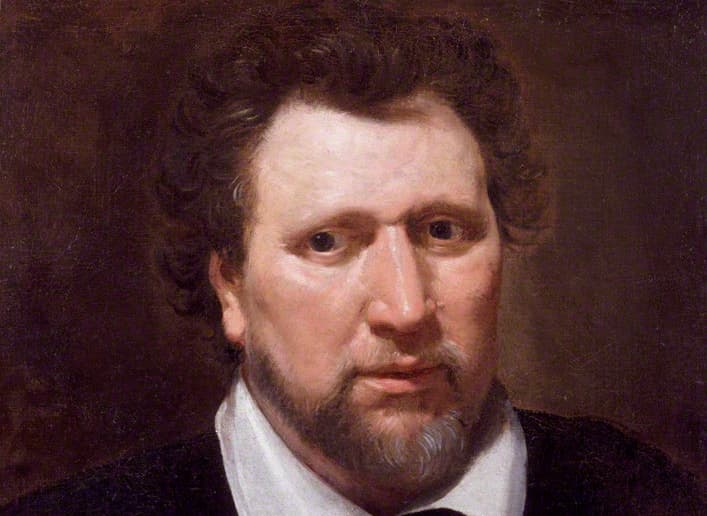Poem of the Day: ‘To Celia’
Ben Jonson’s love poem, elegant and frail as a bubble, first envisions love as a pledge drunk together, in a spirit more potent and ethereal than any wine.

The Cavalier poets of the 17th century, the courtiers clustered around King Charles I (1600–1649), descend from what we now call the English Silver Age poets. These earlier poets included the likes of Sir Thomas Wyatt (1503–1542) and Henry Howard, the Earl of Surrey (1517–1547): the courtier poets of the sixteenth century, when the court was that of Henry VIII (1491–1547).
Their literary generation, having imported the sonnet from Italy, began generally inventing a literature in modern English, all the while moving in and out of favor at court. Wyatt reputedly flirted with the queen, Anne Boleyn, which was tantamount to flirting with the headsman. Howard, cousin to both Anne Boleyn and her brief successor, Catherine Howard, did lose his head, largely for the crime of being related to both these queens.
About the Silver Age poets, the contemporary Irish poet Eavan Boland (1944–2020) once wrote that their “poems smell of the gallows.” It’s no real surprise that the Cavaliers, born into the next contentious century, should have inherited the trope of life, and of love, as a brevity to be grasped even as it all flees away.
But between those Silver Poets and the Cavaliers comes the man whom the Cavaliers explicitly claimed as their patriarch. They called themselves the Tribe of Ben, the literary heirs of Ben Jonson (1572–1637). Jonson, a contemporary of William Shakespeare (1564–1616), was born in the Tudor era, rose to fame as a dramatist in the Jacobean, and died in the doomed reign of the first King Charles.
His own inheritance from the Silver Agers was the emergent modern English poetry: all those sonnets, songs, and masques, as well as the dramatic forms that had begun to enliven the London stage. His legacy we can see in the poems his Tribe produced. Sir John Suckling’s “Out Upon It” and “Why So Pale and Wan, Fond Lover,” both of which have appeared previously as the Sun’s Poem of the Day, are prime examples, as is “Song,” by Richard Lovelace, which readers will also recall from its outing here last September.
Jonson’s own art of the love poem, elegant and frail as a bubble, displays itself in today’s selection, “To Celia.” In common meter, alternating tetrameter with rhymed trimeter lines, the poem first envisions love as a pledge drunk together, in a spirit more potent and ethereal than any wine. At the poem’s end, however, love is a spirit of another kind: the lover’s breath whose sweetness (strangely enduring, as an ordinary breath is not) imparts lingering life and fragrance to a wreath of flowers.
To Celia
by Ben Jonson
Drink to me, only, with thine eyes,
And I will pledge with mine;
Or leave a kiss but in the cup,
And I’ll not look for wine.
The thirst, that from the soul doth rise,
Doth ask a drink divine:
But might I of Jove’s Nectar sup,
I would not change for thine.
I sent thee, late, a rosy wreath,
Not so much honoring thee,
As giving it a hope, that there
It could not withered be.
But thou thereon did’st only breathe,
And sent’st it back to me:
Since when it grows, and smells, I swear,
Not of it self, but thee.
___________________________________________
With “Poem of the Day,” The New York Sun offers a daily portion of verse selected by Joseph Bottum with the help of the North Carolina poet Sally Thomas, the Sun’s associate poetry editor. Tied to the day, or the season, or just individual taste, the poems are drawn from the deep traditions of English verse: the great work of the past and the living poets who keep those traditions alive. The goal is always to show that poetry can still serve as a delight to the ear, an instruction to the mind, and a tonic for the soul.
